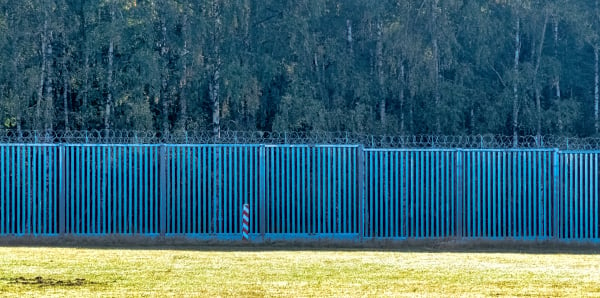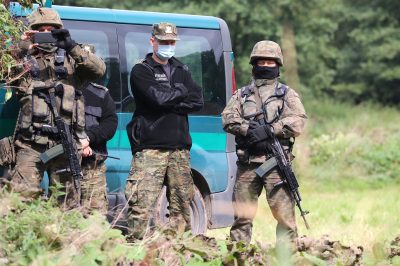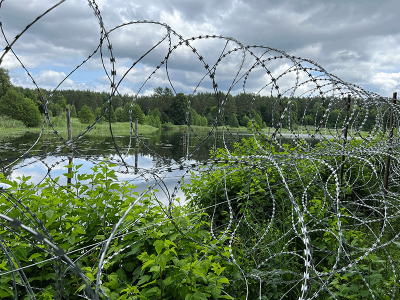
The court has acquitted a group of people who were delivering humanitarian aid. The Border Guard decided to prosecute these persons for administrative offences - violation of the ban on entering the "border strip" and bringing objects across the border with Belarus. The court found that the persons acted in a state of necessity to save the health and lives of people on the other side of the wall and that they could not be punished in any way for this. The accused activists were represented by lawyers from the Helsinki Foundation for Human Rights.
Help through the wall
In the winter of 2023, a group of activists assisted migrants on the other side of the wall built on the border with Belarus. This assistance included the provision of food, drinks and clothing.
The Border Guard filed charges against these people, accusing them of committing administrative offences, namely disregarding the ban on entering the zone adjacent to the state border, the so-called "border strip", and the ban on bringing objects across the border with Belarus. These prohibitions result from two regulations issued by the Governor of Podlasie. In July, the Provincial Administrative Court in Białystok, following a complaint by the Ombudsman, annulled the Governor's regulation banning the passing of objects. The court in Białystok found that the governor had exceeded his powers by issuing this measure, but the governor has appealed the ruling, so the judgment is not yet final.
Court: No punishment for humanitarian aid
The activists' case was brought before the District Court in Bielsk Podlaski, based in Hajnówka. On 12 October 2023, the court handed down its judgment and acquitted the defendants of all charges.
The court found that the activists' motives were purely humanitarian and related to helping people on the other side of the wall in life- and health-threatening situations. The migrants could not count on the help of the Belarusian authorities, so the activists' support was essential.
"The court found that the activists acted out of necessity. For the court, saving vulnerable people was more important than complying with the prohibitions in the Governor's regulations," says Jarosław Jagura, an HFHR lawyer who defended the activists.
In the verbal justification of the ruling, the court stressed that the activists' behaviour was socially useful and testified to their nobility in a situation where the authorities seemed to have ignored the problem and turned a blind eye to it. The court pointed out that the situation on the Polish-Belarusian border is a major humanitarian crisis that cannot be disregarded when assessing the actions of the helpers.
Aleksandra Kramer, one of the activists concerned, commented on the judgment:
The acquittal for our group, the people bringing humanitarian aid to the Polish-Belarusian border, is an important victory in the context of the situation at the border. The judgment underlines that we are acting in a purely humanitarian way, responding to the threat to the lives and health of people on both sides of the barrier. This message is important because the humanitarian crisis continues and people are in extremely difficult conditions every day.
The court found that we acted in a state of necessity and held that the authorities are blind to the suffering of the people on the move.
The activists were represented in court by advocate Jarosław Jagura advocate trainee Konrad Siemaszko. The HFHR, together with the Szpila Collective, provides legal assistance to people who are oppressed for helping at the Polish-Belarusian border.
Migrants who spend days or even weeks in forests and humid border areas without access to water, food, and warm and dry clothes are in immediate and real danger of losing their health and lives. Media reports of migrants' bodies being found in border areas are recurrent. Since the humanitarian crisis began in August 2021, there have been at least 55 confirmed deaths at the border.


